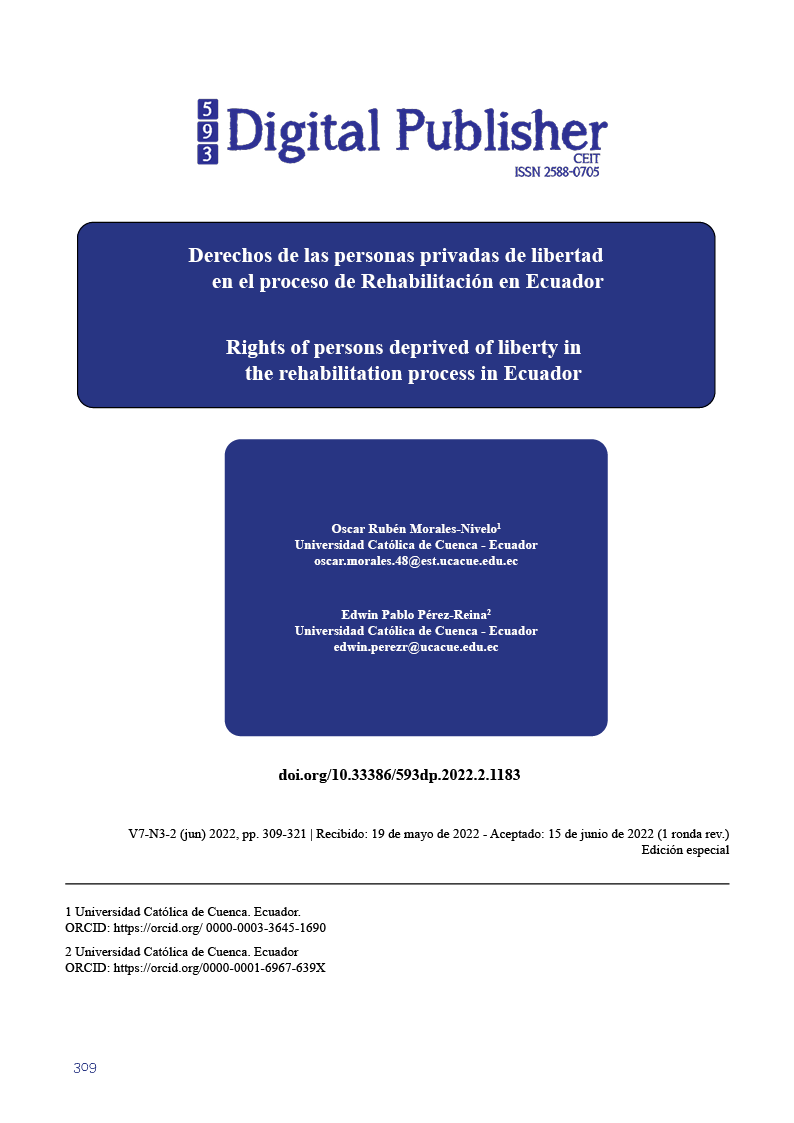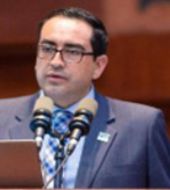Rights of persons deprived of liberty in the rehabilitation process in Ecuador
Main Article Content
Abstract
The rights of persons deprived of liberty in the process of social rehabilitation in Ecuador, is a latent problem since in the rehabilitation system there is a constant violation of these rights as a result of bad policies to meet the needs of inmates, lack of resources, and even inadequate staff that do not allow to reach the fundamental objective of rehabilitation. The objective of this study was to analyze the rights of persons deprived of liberty in the rehabilitation process established in Ecuador's criminal law. The methodological strategy was carried out with a descriptive type of research and a qualitative approach, from the bibliographic review through the study of concepts, and analysis of the rights of persons deprived of liberty, as well as the current regulations, in order to describe the phenomenon of study, applying the analytical, synthetic and comparative methods determining the rights that are being violated in the Social Rehabilitation Centers of Ecuador, the factors that influence the violation, generating a proposal aimed at improving the fulfillment of each of the rights of this group of people in their rehabilitation. It is inferred from the results of the research that the rights of persons deprived of liberty are being violated due to the lack of application of constitutional guarantees and international treaties by the state regarding the fundamental rights of this group of priority attention.
Downloads
Article Details

This work is licensed under a Creative Commons Attribution-NonCommercial-ShareAlike 4.0 International License.
1. Derechos de autor
Las obras que se publican en 593 Digital Publisher CEIT están sujetas a los siguientes términos:
1.1. 593 Digital Publisher CEIT, conserva los derechos patrimoniales (copyright) de las obras publicadas, favorece y permite la reutilización de las mismas bajo la licencia Licencia Creative Commons 4.0 de Reconocimiento-NoComercial-CompartirIgual 4.0, por lo cual se pueden copiar, usar, difundir, transmitir y exponer públicamente, siempre que:
1.1.a. Se cite la autoría y fuente original de su publicación (revista, editorial, URL).
1.1.b. No se usen para fines comerciales u onerosos.
1.1.c. Se mencione la existencia y especificaciones de esta licencia de uso.
References
Americanos, O. d. (1969). Convencion Americana sobre Derechos Humanos (Pacto de San José). San Jose, Costa Rica.
Arroyo, L. (2019). Enfoque Criminológico del derecho al trabajo de las personas privadas de libertad en el Ecuador. 195.
Asamblea Nacional. (2014) Código Orgánico Integral Penal. Quito: Corporacion de Estudios y Publicaciones.
Asamblea Nacional. (2008). Constitucion de la Republica del Ecuador, A. C. (2008). Montecristi.
Asamblea General de las Naciones Unidas (1990). Principios básicos para el tratamiento de los reclusos. Nueva York.
Cabanellas, G. (2011). Diccionario de Ciencias Juridicas. Buenos Aires: Heliasta S.R.I.
Comisión Interamericana de Derechos Humanos. (2008). Principios y buenas prácticas sobre la protección de las personas privadas de libertad en las Américas. Washington.
Gamboa Pazmiño A. (2017). Las Finalidades del Régimen de rehabilitación Social.
González, J. P. (2018). Los Derechos Humanos de las personas privadas de libertad. Una reflexion doctrinaria y normativa en contraste con la Realidad penitenciaria en Ecuador. Revista Latinoamericana de Derechos Humanos, 203.
Intriago Muñoz. (2020). Hacinamiento de los centros penitenciarios del Ecuador y su incidencia en la transgresión de los derechos humanos de los reclusos. Revista Recimundo, Pág. 18.
Iñigo. (2007). Ayer, hoy, ¿mañana?: la cárcel y sus crisis.
Machado, M., Hernández, G., Inga, J., & Torres, T. (2019). Rehabilitacion y Reinserción: Una quimera para los privados de libertad. Revista Digital de Ciencia, tecnologia e Innovación, 867.
ONU, P. C. (1955). Reglas mínimas para el tratamiento de los reclusos. Ginebra.
Organización de las Naciones Unidas. (1955). Reglas mínimas para el tratamiento de los reclusos. Ginebra.
Piedra, J. (2014). El sistema penitenciario entendido como el derecho a una digna rehabilitación social de las personas privadas de la libertad en el Ecuador. Quito: Universidad de las Américas.
Perú Defensoría del Pueblo . (17 de 07 de 2012). Obtenido de https://www.defensoria.gob.pe/grupos-eatencion.php?des=17
Rodríguez, A., y Pérez, A., (2017) Métodos científicos de indagación y construcción del conocimiento, Revista Scielo, 82 (Pág. 179-200) DOI: https://doi.org/10.21158/01208160.n82.2017.1647
Sepúlveda. (2015). Los Derechos de las personas privadas de libertad. Loja, (Pág. 21)
Zaragoza, J. (2012). El nuevo sistema penitenciario mexicano: de la justicia retributiva a la justicia restaurativa. Editorial Tirant Lo Blanch (Pág. 86).



